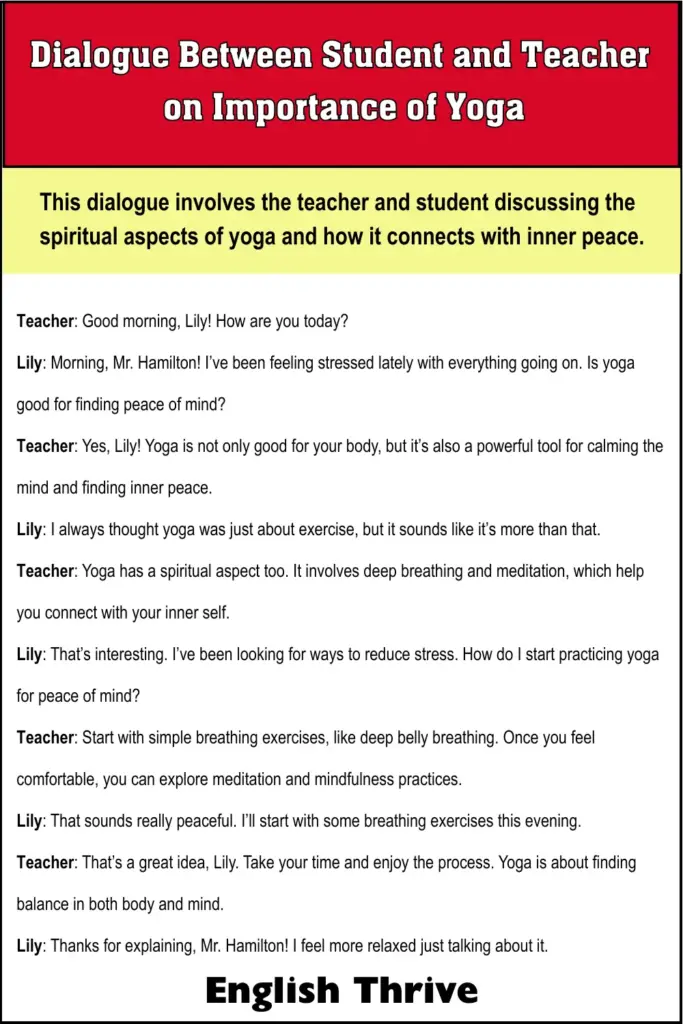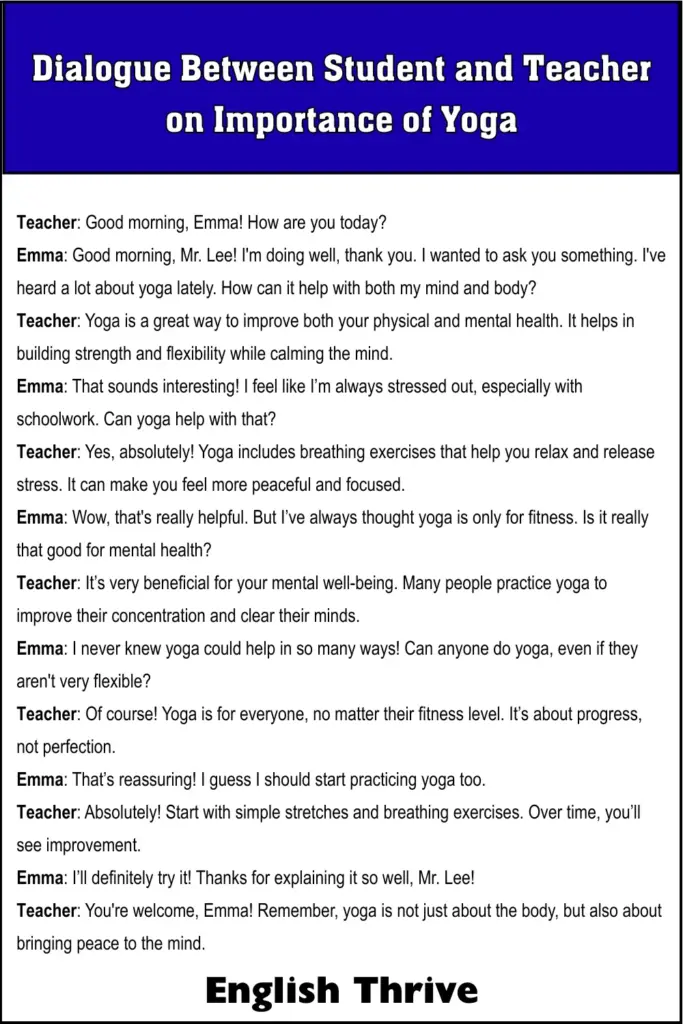Yoga has gained popularity worldwide due to its physical, mental, and spiritual benefits. It not only promotes flexibility and fitness but also helps manage stress, anxiety, and promotes overall well-being. In these dialogues, a student discusses the importance of yoga with their teacher.
Contents
ToggleSample 1: Dialogue Between Student and Teacher on Importance of Yoga
Context:
In this dialogue, a student is curious about how yoga can help with both mental and physical health. The teacher explains in simple terms.
Teacher: Good morning, Emma! How are you today?
Emma: Good morning, Mr. Lee! I’m doing well, thank you. I wanted to ask you something. I’ve heard a lot about yoga lately. How can it help with both my mind and body?
Teacher: Yoga is a great way to improve both your physical and mental health. It helps in building strength and flexibility while calming the mind.
Emma: That sounds interesting! I feel like I’m always stressed out, especially with schoolwork. Can yoga help with that?
Teacher: Yes, absolutely! Yoga includes breathing exercises that help you relax and release stress. It can make you feel more peaceful and focused.
Emma: Wow, that’s really helpful. But I’ve always thought yoga is only for fitness. Is it really that good for mental health?
Teacher: It’s very beneficial for your mental well-being. Many people practice yoga to improve their concentration and clear their minds.
Emma: I never knew yoga could help in so many ways! Can anyone do yoga, even if they aren’t very flexible?
Teacher: Of course! Yoga is for everyone, no matter their fitness level. It’s about progress, not perfection.
Emma: That’s reassuring! I guess I should start practicing yoga too.
Teacher: Absolutely! Start with simple stretches and breathing exercises. Over time, you’ll see improvement.
Emma: I’ll definitely try it! Thanks for explaining it so well, Mr. Lee!
Teacher: You’re welcome, Emma! Remember, yoga is not just about the body, but also about bringing peace to the mind.
 Dialogue Between Student and Teacher on Importance of Yoga
Dialogue Between Student and Teacher on Importance of Yoga
Sample 2: Dialogue Between Student and Teacher on Importance of Yoga
Context:
This dialogue focuses on a teacher explaining how yoga can help with focus and productivity during study sessions.
Teacher: Hello, Jake. How’s your studying going?
Jake: Hi, Ms. Turner! It’s going alright, but I often feel distracted. I lose focus easily, especially during long study sessions. Any suggestions?
Teacher: Have you tried yoga? It’s a great way to enhance your focus and concentration.
Jake: Yoga? How does that help with studying?
Teacher: Yoga involves mindful breathing and posture techniques that can train your mind to stay focused. It also helps you relax, so you’re more productive.
Jake: That sounds interesting! But I’m not sure if I have time for yoga in my busy schedule.
Teacher: You don’t need a lot of time. Just ten to fifteen minutes of yoga before studying can make a huge difference.
Jake: Wow, that’s a short amount of time! What kind of yoga exercises can I try?
Teacher: Start with simple poses like the ‘mountain pose’ and ‘child’s pose.’ These will help you center your mind.
Jake: I can do that. Do I need any special equipment?
Teacher: All you need is a yoga mat and some comfortable clothes. It’s that simple!
Jake: Great! I’ll try yoga before my next study session and see if it helps.
Teacher: Good luck, Jake! Let me know how it goes.
Sample 3: Dialogue Between Student and Teacher on Importance of Yoga
Context:
This dialogue focuses on a conversation about the importance of yoga in maintaining a healthy lifestyle.
Teacher: Good afternoon, Sarah. How have you been feeling lately?
Sarah: Afternoon, Mr. Roberts! I’ve been feeling a bit tired and out of shape lately. I was thinking about starting a fitness routine. Do you think yoga is a good choice?
Teacher: Yoga is a wonderful choice, Sarah. It not only keeps you fit but also improves your overall well-being. It’s a balanced approach to fitness.
Sarah: I’ve heard yoga can help with flexibility, but I didn’t know it could do more than that.
Teacher: Yes, it’s great for flexibility, but it also helps with muscle strength, balance, and even mental clarity.
Sarah: That’s amazing! I’ve always wanted to improve my balance. Does yoga help with that?
Teacher: Absolutely! Many yoga poses challenge your balance and help you develop better stability over time.
Sarah: That sounds perfect! Do you need to be very fit to start yoga?
Teacher: Not at all! Yoga is for all fitness levels. You can start at your own pace and gradually build up your strength and flexibility.
Sarah: I’m glad to hear that. I’ll try some beginner poses this weekend.
Teacher: Great decision, Sarah! Start slow, listen to your body, and enjoy the process.
Sample 4: Dialogue Between Student and Teacher on Importance of Yoga
Context:
In this dialogue, the teacher explains how yoga can help improve posture and reduce body pain, especially for students who sit for long hours.
Teacher: Hello, Ben! How’s everything going with your studies?
Ben: Hi, Ms. Clark! It’s going well, but I’ve been getting some back pain from sitting too much while studying. Do you have any advice for me?
Teacher: Actually, yoga is very effective for relieving back pain. It helps stretch and strengthen the muscles in your back.
Ben: I didn’t know that! How exactly does yoga help with back pain?
Teacher: Yoga encourages proper alignment and posture. It also helps release tension in the muscles, which can reduce pain and stiffness.
Ben: That sounds amazing. Will I have to do complicated poses to see results?
Teacher: No, you can start with simple stretches like the ‘cat-cow pose’ and ‘downward dog.’ These are great for your back.
Ben: Those sound easy to do. I’ll definitely give them a try. How often should I practice yoga?
Teacher: Try doing yoga every day, even if it’s just for 10 to 15 minutes. Consistency is key.
Ben: I’ll make time for it! Thanks for the advice, Ms. Clark.
Teacher: You’re welcome, Ben! Let me know how it goes.
Sample 5: Dialogue Between Student and Teacher on Importance of Yoga
Context:
This dialogue involves the teacher and student discussing the spiritual aspects of yoga and how it connects with inner peace.
Teacher: Good morning, Lily! How are you today?
Lily: Morning, Mr. Hamilton! I’ve been feeling stressed lately with everything going on. Is yoga good for finding peace of mind?
Teacher: Yes, Lily! Yoga is not only good for your body, but it’s also a powerful tool for calming the mind and finding inner peace.
Lily: I always thought yoga was just about exercise, but it sounds like it’s more than that.
Teacher: Yoga has a spiritual aspect too. It involves deep breathing and meditation, which help you connect with your inner self.
Lily: That’s interesting. I’ve been looking for ways to reduce stress. How do I start practicing yoga for peace of mind?
Teacher: Start with simple breathing exercises, like deep belly breathing. Once you feel comfortable, you can explore meditation and mindfulness practices.
Lily: That sounds really peaceful. I’ll start with some breathing exercises this evening.
Teacher: That’s a great idea, Lily. Take your time and enjoy the process. Yoga is about finding balance in both body and mind.
Lily: Thanks for explaining, Mr. Hamilton! I feel more relaxed just talking about it.
 Dialogue Between Student and Teacher on Importance of Yoga
Dialogue Between Student and Teacher on Importance of Yoga
FAQs About Dialogue Between Student and Teacher on Importance of Yoga
1. Why is yoga important for teachers and students?
Improves Focus: Enhances concentration for both teaching and learning.
Reduces Stress: Helps manage stress and promotes mental clarity.
Physical Health: Increases strength, flexibility, and posture.
Emotional Balance: Encourages mindfulness and emotional stability.
Boosts Energy: Energizes both mind and body for better productivity.
2. How to write a dialogue between student and teacher?
Set the Scene: Briefly explain the situation.
Introduce Characters: Mention the names and roles of the speakers.
Use Simple Language: Keep it natural, polite, and easy to understand.
Alternate Dialogue: Each speaker has their own paragraph.
Maintain Flow: Ensure the conversation logically progresses.
3. What is the importance of yoga in our life? (10 points for students)
Improves Health: Boosts flexibility and strength.
Reduces Stress: Calms the mind with breathing exercises.
Enhances Focus: Helps with concentration and learning.
Promotes Clarity: Clears the mind for better decision-making.
Better Posture: Strengthens muscles and improves alignment.
Increases Energy: Revitalizes body and mind.
Boosts Immunity: Strengthens the immune system.
Emotional Balance: Reduces anxiety and promotes peace.
Improves Sleep: Helps regulate sleep for better rest.
Teaches Discipline: Promotes consistency and self-control.

